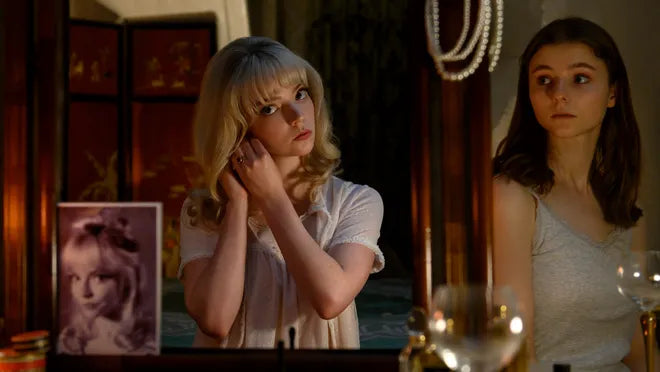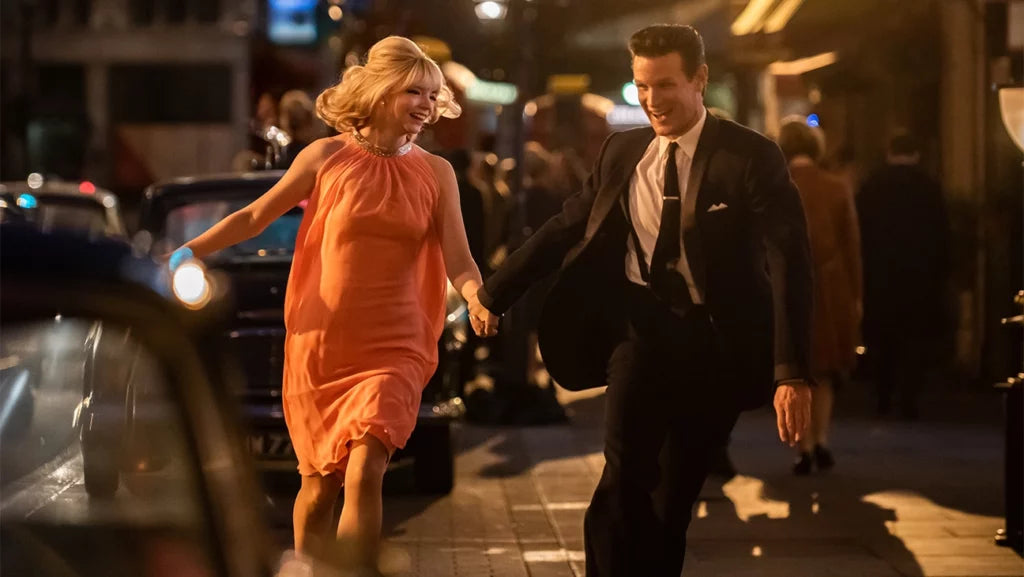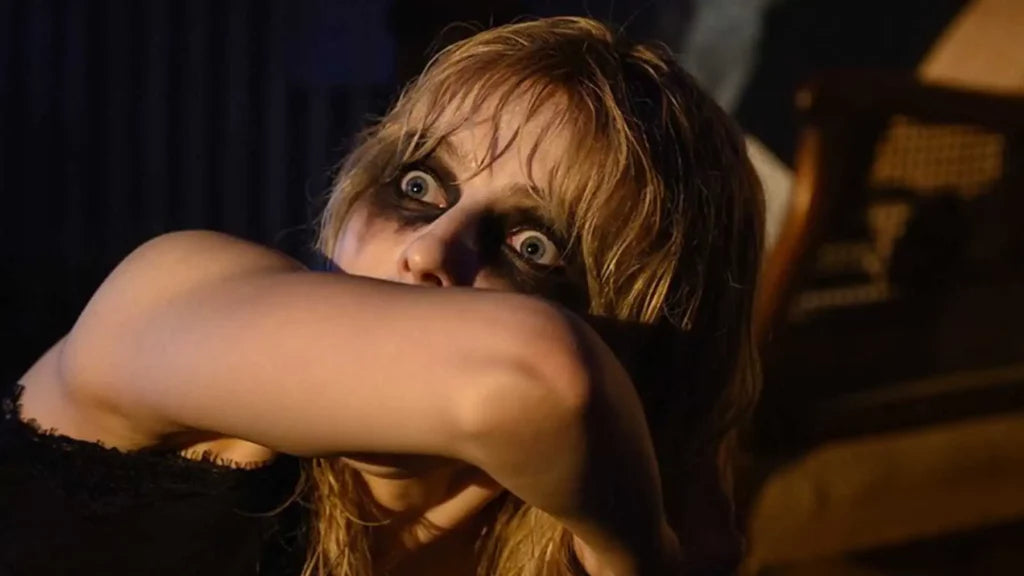Last Night in Soho, the latest film from stylish British filmmaker Edgar Wright, is a Hitchcockian thriller doused in the colors of giallo horror. Wright has played in the realm of blood and gore before (this is the man who first made a name for himself with Shaun of the Dead, after all) but Soho marks his first time diving fully into the horror genre - it’s an irrevocably scary movie through and through.
But while the writer / director / producer’s usual sense of witty humor has been replaced by psychological thrills and blood-curdling screams, his signature flair and captivating kinetic energy of the camera and editing work is still very much present. As, of course, is his usage of a grooving and wonderful soundtrack.
Last Night in Soho centers on a young woman named Eloise (Thomasin McKenzie), who has lived out in rural England with her kindly grandmother (Rita Tushingham) ever since the passing of Eloise’s mother when she was a small child. Perhaps this is partly why the aspiring fashion designer has a love for a bygone era rather than her own generation; Eloise is obsessed with the culture, music and style of the Swinging Sixties that she’s grown up on.

McKenzie (Jojo Rabbit, Old, Leave No Trace) plays Eloise with an airy sense of innocence and whimsy, a girl with her head in the clouds and her heart in the past. At home, she moves around her home with the soft grace of a dancer. But when she makes a big move to London to pursue her dreams at the College of Fashion, she becomes stiff and far more reserved. A drastic life change like that would bring out a quiet reservation in anyone, but Eloise also has the misfortune of landing a cruel and bullying roommate (Synnøve Karlsen) who makes her feel extremely unwelcome and like even more of an outsider.
Overwhelmed and desperate for a sense of familiar comfort (but not willing to give up), Eloise moves out of the school and into a bedsit owned by a stern elderly woman named Alexandra (the late Diana Rigg in her final performance). It’s here that Eloise begins having extraordinarily vivid dreams of being transported back to the 60s, where she both observes and at times seemingly becomes a glamorous woman by the name of Sandie (Anya Taylor-Joy). Like her modern counterpart, Sandie is looking to make her big dreams come true in the big city as well. Upon arriving in Soho, she quickly impresses the men of an upscale nightclub she hopes to sing at, including the interest of a seedy man named Jack (Matt Smith).
Wright’s colorful and fluid style - combined with the camera wizardry of cinematography Chung-hoon Chung (Oldboy, It) - appropriately takes on a more dreamlike quality than his previous work. The film’s best sequence is Eloise / Sandie’s first night in 60s Soho, where the mesmerizing lights and music play in sync with the ladies’ graceful dance movements and clever use of mirrors show how the two are intertwined not physically, but mentally and spiritually. As the film progresses, and Eloise’s dreams become darker as Sandie is tragically thrown into the lion’s den of misogyny and broken dreams, the colors take on a more menacing tone, and the whimsy is replaced with merciless nightmare fuel as the dreams begin to bleed into Eloise’s life in the modern day.

Last Night in Soho is a grim look at the fates that befall far too many women in a patriarchal society; how men manipulate, use and abuse women who are offered very little choice but to subject themselves to those men in hopes of the life they’re yearning for. This certainly applies to the showbiz world of the Swinging Sixties, and Wright uses the period and Eloise’s rose-colored view of it to examine how nostalgia can blind us to the horrifying reality of things. When Sandie first arrives at the nightclub, it appears bright, cheerful, and celebratory - the young star can’t wait to be up on the stage. By the time she’s performing there, the uncomfortable truth is impossible to deny: the show is humiliating, nothing more than a perverse place for the club’s sole audience - old, white, leering businessmen - to ogle at women’s bodies as they dance around.
Yet despite the strength of the wonderful cast and Wright’s proficiency as a filmmaker, Soho struggles to tie its ideas of the past to the story taking place in the present. We’re meant to connect Sandie’s tragic journey with that of Eloise’s, but the nostalgic young woman’s biggest issues have little to do with misogyny. While both women move to London with hopes that are quickly dashed, Eloise’s main problem is the bullying of her roommate - a character who goes from realistic enough to outright obsessive and dangerous, something the film strangely doesn’t have enough time to properly reconcile with by its end. What Eloise experiences is terrible, yes, but it also pales in comparison to the ordeals we see Sandie go through.

One of Eloise’s classmates by the name of John (Michael Ajao) acts as a romantic interest, but the relationship is never able to really form. John claims to relate to Eloise’s unique individuality, but this falls flat when we never learn who exactly John is in the first place. And once Eloise’s dreams turn to nightmares and she becomes a dangerous, sleep-deprived mess, it’s hard to understand why John bothers to stick around, especially after a messy incident where he’s caught in her room by Alexandra the landlady. Relating to the pain of others and empathizing with them seems to be the film's idea about how we can heal, and possibly overcome, past traumas. But this never comes to fruition as well as it could, or at least not between every character the way it should.
Perhaps the most glaring issue is how Eloise’s romanticized nostalgia for the 60s isn’t ever presented as a real flaw. It doesn’t ever shut her off from the world, and she’s well aware that she’s living in the present rather than the past, even when her mental state starts to deteriorate later on. Toss in an entirely unnecessary mental illness angle that relates to her deceased mother, as well as an equally as unnecessary detail about how Eloise possesses a kind supernatural sense, and everything Last Night in Soho is trying to say becomes increasingly muddled the further it goes. As lavish, entertaining, and even as scary as the film is, by the time the credits roll, the story feels thin and never fully realized.
‘Last Night in Soho’ is now playing in theaters.




